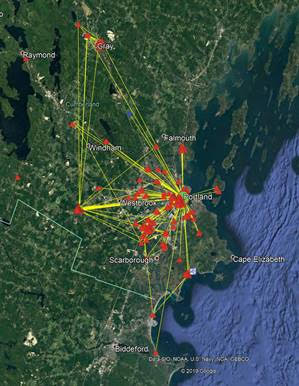AES is privately held and more than 40 years old. It originally developed security products specifically for the Government market and then created a solution to send alarm signals in areas around the world that did not have phone lines or internet service.
Today AES still provides security solutions to government facilities and embassies around the world without the need for any public infrastructure. AES-IntelliNet long-range wireless private mesh radio technology allows alarm companies, such as Norris, the ability to create their own private network with limited public infrastructure. It’s the most reliable form of alarm communications and has delivered under the most severe weather conditions even when cell towers and internet coverage is down.
One of Norris’ main goals in 2019 was to expand its AES mesh radio network.
According to Norris Service Consultant and AES Network Administrator Paul Bennett, the company did just that
“We had a pretty good year. We started 2019 with 123 total subscribers,” Bennett said. “As we close out the year, we are sitting at 240 subscribers with a backlog of scheduled installation to start 2020.”
Bennett said that Norris had picked up key customers where radios were set up to expand coverage. Customers picked up include the Town of Windham, The Univerity of Maine, and retirement community Piper Shores.
“This year we activated the USM Portland and Gorham campuses (37 units), Piper Shores (15 units) and have partnered with the Town of Windham to extend our network there,” Bennett said.
He noted that it wasn’t just sheer numbers of new radios, but also expanding the functionality of some of the existing radios.
“We have increased the reliability of our network with the introduction of Hybrid Subscribers that came out in 2019,” He said. “These subscribers can act as a receiver that passes traffic directly to the receivers at the central station. By placing the Hybrids in strategic locations, we can build in redundancy should our central receivers fail.”
As far as building out other areas to approach covering the whole state, Bennett said the work was being done.
“We have a salesman trained in the Bangor area who is working diligently at growing the network there,” Bennett said. “We should have all of Westbrook housing online within a few months and are in negotiations with another university to set up a micro-network there.”
Bennett said there were many reasons to come online with Norris’ AES network, including being able to eliminate costly phone lines, faster transmission of data to central station, no single communication line/point of failure, supervision of radio signals, inexpensive lease options that equate to a low upfront installation cost, monitoring/maintenance/service costs included in lease plans, and being able to avoid the technology upgrade cycle one typically finds with competing technologies like cellular.




Leave A Comment